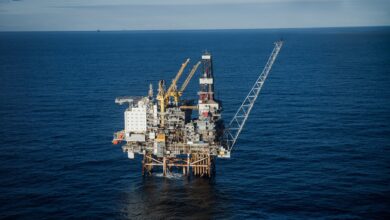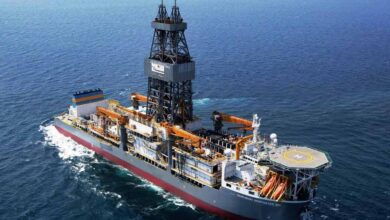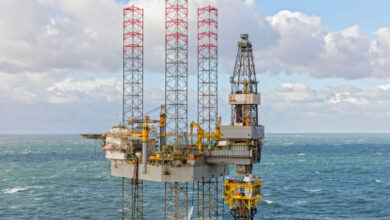Tax systems can tip the scales on brownfields
Critical D&C issues with Nick Walker, Talisman Energy
By Jeremy Cresswell, contributing editor
Nick Walker is executive vice president – international operations West for Talisman Energy.

DC: From your perspective, what are the main critical issues that affect the North Sea business at this time?
Walker: There are a number of issues. We are, I hope, progressing out of recession. Oil prices have recovered somewhat, but gas prices still haven’t, and I think the latter will stay low in Europe for some time. This will be an issue for the gas-led part of the business. Fortunately, Talisman’s business in the North Sea is oil-focused.
Also, there are a lot of smaller companies out there struggling to secure the financing needed to fund their plans.

A lot of the buoyancy in North Sea drilling activity over the last few years was a result of new entrants who were able to secure equity financing. Activity from these smaller players has pretty well dried up and, with it, drilling.
I think another issue is the high cost of doing business in the North Sea. Over the past few years, we have seen a massive escalation in the cost of operations – this was fine whilst the oil price was rising but is a big issue at current prices. The North Sea is a mature province, and both the operators and supply sectors need to work together to drive operating efficiencies if the basin is to be competitive into the future.
The North Sea still has huge potential, but industry and government need to work together to unlock this potential.
DC: At this time (December 2009), only five MODUs plus one platform unit are engaged in E&A drilling. What’s your view on this level of activity?
Walker: I find that very worrying. In the UK North Sea, both government and industry agree that the aspiration is to maximise recovery from the basin.
There are a number of issues that go with reduced drilling, and one is that we’re not going to continue to make the discoveries that are needed to sustain production levels.
Time is of the essence, as new discoveries tend to be small and, to be economically viable, need to be tied back into the existing infrastructure. If we don’t explore for the resources needed to help keep it financially viable, then we’re going to see early decommissioning of major parts of that infrastructure.
If it goes, small fields that have the potential to be produced may never get developed.
DC: Norway is different and apparently better off, but how different and how much better off?
Walker: In 2009, Norway enjoyed record activity levels. I think that’s driven by two things. One is that there’s been quite a bit of commitment to rigs, which has to be followed through on. The other thing is the tax environment, and that’s where I see a big difference between the UK and Norway.
In Norway, the government has over a long period of time recognised the need to nurture the industry, and there are tax incentives designed to achieve this.
For example, for small players in Norway who don’t have production, if they drill an exploration well, they get 78% of the cost back from the government upfront. The point of that is to create an even playing field – when you get production, you will start paying tax.
DC: Does that genuinely work as an incentive? Because there is a view that it may not necessarily achieve what the Norwegian government wants. It’s certainly different from the UK, where it would seem more needs to be done to assure future viability.
Walker: For Talisman working in Norway, having that incentive doesn’t make a lot of difference because we already pay tax. But it does encourage the small players to go out and explore and bring innovative ideas forward.
We saw a lot of activity from small players in the UK until the global financial crisis. But it hasn’t fallen away significantly in Norway, and there are still lots of small players out there actively exploring for oil and gas. The more companies that are out there doing it, the greater the chance of success.
I’m not suggesting the same solution for the UK, but something needs to be done. There is a fairly high tax take for marginal opportunities and, while there has been change in the tax regime over the last year, I think it’s not nearly enough to encourage continued and growing exploration in smaller, more marginal opportunities.
The UK government’s Field Allowance proposals are a step in the right direction, but if I look at Talisman’s portfolio, it does very little for us. While we welcome the change, it’s not nearly enough to encourage further activity.
In terms of tax take, there are a number of issues. A better job needs to be done around encouraging further exploration and development activity on small fields that will be tied back into the major infrastructure hubs. That will in turn extend the lives of the major fields.
There needs to be encouragement of development of the remaining opportunities within PRT (Petroleum Revenue Tax)-paying fields. Talisman has quite a number of fields where, because they’re PRT-liable, we pay 75% tax on production from them. For small, incremental opportunities, that’s restrictive. Something needs to be done to reduce that burden of taxation.
Then there is the issue of decommissioning security. As independents and small players have taken on mature fields from the majors, and often shouldered the decommissioning liability too, they have had to supply security to support that future decommissioning obligation on a pre-tax basis and with an allowance for potential overspend.
In many cases, PRT-paying companies such as ourselves have had to put up security up to four times the ultimate abandonment liability. Government can play a part in this by helping to reduce the burden of security by guaranteeing the tax relief upfront, which has no ultimate cost to the taxpayer, so freeing up money for us to invest further in the province.
The industry has been consulting with the government for some time to push the case for change in all of these important areas.
DC: Would you please expand further?
Walker: What we’re seeing with the financial turmoil is that all the little guys on the UKCS have effectively stopped exploring. UK exploration drilling has reduced from 44 wells in 2008 to a projected 23 wells in 2009.
Even for Talisman, we cut back our spend in 2009 as we’ve gone from two mobile rigs to one for 2010. We have reduced our development drilling activity too, though we’ll pick it up again through the middle of 2010.
In Norway, we’ve had two rigs running but will have slightly less than that for the year ahead.
Industry and government need to react quickly and jointly to try and see whether it is possible to restore UK activity to where it was even a year ago.
On the bright side, the cost of doing business is declining. For example, rig rates have come off. They had to, as they were too high and are probably still too high.
DC: How many wells, E&A and development, did Talisman drill in 2009 and what is the plan for 2010?
Walker: We’ll have done seven exploration and development wells in the UK during 2009; in 2010 it will be five. The bigger story is that, as already indicated, we’ve cut our mobile rig requirement from two to one.
In Norway, it’s going to be about flat year-on-year.
The rig contracts run out early in 2011, and so we have some really big decisions going into 2011 and beyond around commitment to rigs.
I think we’re not untypical for the industry. When it was tough to get rigs, we were all contracting them on a long-term basis. When the market turned, we all had more rig time than we actually wanted. The industry has changed, and there’s quite a bit of uncertainty out there for the rig contractors, especially on what’s going to happen, particularly in the UK beyond 2010.
We still think there is more to play for on the exploration front in the Central North Sea, for example. We’ve just drilled three successful wells at Cayley, Godwin and Shaw (all in Montrose/Arbroath assets area). There are still some exciting-looking exploration prospects in our portfolio … we’re going to drill a couple of wells in 2010 around some of our other acreage hubs. In Norway we have made the exciting Grevling discovery, which we will appraise during 2010.
DC: How does the North Sea fit into the wider Talisman portfolio and how do the issues that you currently face in Northwest Europe compare with other geographic areas?
Walker: A new corporate business strategy was rolled out in mid-2008 directed at three main levers.
First, establishing a balance of growth and returns by targeting long-term opportunities, and that’s driven mainly by North American unconventional gas and Southeast Asia.
Second, repositioning our global exploration to be managed as a portfolio, so continuously high-grading and using it to support our existing core production areas, but more importantly to build new production areas that have the potential to renew the firm – places like Peru, Colombia, Kurdistan, PNG, Indonesia and Vietnam.
Third, maximising value from existing mature areas – North Sea and North American conventional gas. We don’t see ourselves growing those, rather delivering sustainable production and maximising value; also exiting non-strategic areas.
Every area has its challenges and issues. Sure the North Sea is high cost, but it is very important to us. We think we can achieve sustainable production for many years.
DC: Looking at unconventionals in North America, is there scope for thinking geologically out of the box in the North Sea than has so far been the case and that maybe it could be similarly rejuvenated?
Walker: I don’t think we will see an offshore unconventional business, but there are for sure unconventional opportunities outside of North America, and the industry is starting to look at these.
Unconventionals are a very different business model. Our unconventional business is using techniques that have come out of manufacturing businesses.
We’re thinking about whether those “lean” techniques can be used for managing offshore operations, and I think they can be. I’m sure there will be some learnings from different parts of our business.
As the North Sea has evolved, we have seen new plays being developed. For example, in recent years, there have been some interesting HPHT discoveries in the Central North Sea. We think that the UK Central North Sea has quite a bit of running room available with some new play types that were not being pursued a few years ago.
DC: How critical an issue over the next year or so do you think the supply chain is going to be? Or do you think that after this period of overheating, especially pre-credit crunch, things will settle for the next three or four years?
Walker: We’re very dependent upon our supply chain, and the quality of people, equipment and technology available to us are hugely important to the success of our business.
Costs have increased massively over the last few years and, despite the fact that oil prices have come off, supply chain costs haven’t come off nearly as much.
What’s really important going forward is that, not just oil companies but the service side too needs to focus on efficiency – taking costs out of the business as much as possible and at the very minimum avoiding cost inflation. But we need to be looking more broadly than that.
At least the industry is working together. We participate with other operators and the service side in examining ways in which the industry – in the UK sector, for example – can improve efficiency and strip cost out. But as the North Sea continues to mature, this is going to become an even greater critical issue on which to focus.
DC: Wherever you drill your wells, developing and producing resources, do you think the massive oil price swings, underpinned by the credit crunch, has brought a usefully timed reality check to the industry?
Walker: I think so. What we were seeing when the oil price was at $140 a barrel was unhealthy. Costs were going up every day. There were massive shortages of people and equipment. The cost increases were unsustainable.
Recent events do bring a measure of reality back to the (upstream) business.
DC: Do you therefore think that such events mean that the future of mature provinces like the North Sea really lies in the hands of independents like Talisman and the majors, rather than the small firms, though you earlier noted a significant difference between the UK and Norway regarding such companies?
Walker: If you mirror it on other basins, I think all players have a part to play in the future of the province, and that will evolve over time. But small companies have a role to play, too.
In our case, we’ve had assets that became less material to us, like Beatrice, and yet have been valuable to others. Our disposal of Beatrice to Ithaca (Energy) is an example where this has proved successful.
Industry and government need to work together to create an environment where there is opportunity for all to play a part in the future.
In the North Sea, the big players are not going to want to deal with the very small opportunities. Give them the right playing field, and the small guys can make a business out of them.
But we can’t do that unless we have a business environment that is conducive. Returning to my earlier comment about the UK tax system; this is set up for the start of the basin, not for its future. That has to change.
DC: In a nutshell, what are your thoughts on technology?
Walker: My thoughts on technology are straightforward. We need to drive forward, constantly seeking technological advances. But this must go hand-in-hand with reducing the cost of development. There is no point in new technology if it doesn’t lead to reduced costs, open the door to previously inaccessible resources and improve recovery.




